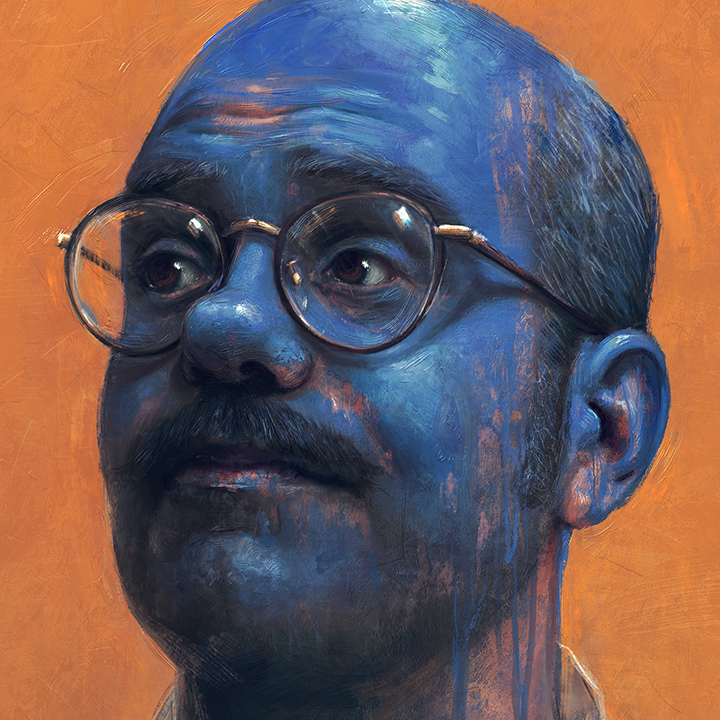I made this comment in another thread but I want more of your eyeballs on it, maybe somebody has something useful to say.
I have some serious anxiety about the fact that modern civilization is all of us in a bus driving towards a cliff, with the driver’s foot firmly on the accelerator pedal. Therapy is available to me, but what the fuck are they gonna say? Tune out?
I’m by no means a mentally healthy individual myself, but I’m coming around to the idea that current mental health practice is mainly concerned with making sure we all stay productive worker bees under capitalism. Feel alienated? Your brain chemistry is off. Feel like nothing means anything and it’s all pointless? That’s not because of the mode of production, YOU are the problem, time to fix your brain!
I dunno man. Antidepressants saved my life, but I find myself questioning the way our society treats these diseases more and more.
I'm in graduate school to be a therapist. All of the students, and the professors, acknowledge that managed care/insurance is absolute bullshit and limiting; however, we're told we have to learn to maneuver the system in order to work. At least at my school, there's a large cohort who critique capitalism and pretty much recognize how solution-focused therapy, CBT, etc. are just tools to be able to create functional workers--professors laugh and agree--but there's little discussion about what to do about it.
If I'm being totally honest, as someone who has been in therapy since 15-years-old, in-patient rehab, IOP, etc., what helped me the most was using mushrooms therapeutically and connecting with nature, meditation, and reading spiritual texts (Taoism, Mahayana Buddhism). I am embarrassed to admit this, as I'm well aware of the pitfalls of "new age" thinking. But it took something radically different for me to see the bigger picture. Is it possible to spawn this kind of change through talk-therapy alone? Probaly not. Mental health research is not making any important discoveries (apart from neurological advances), things are getting worse. Labels provide a convienant language to discuss mental health but it's to complex to narrow diagnosis down to "depression, bipolar, anxiety" etc. As you can tell, I'm frusterated to no end about this and trying to figure out how to create systemic change (or atleast acknowledgement of the problem?) within the system itself.
It's discouraging to hear that even someone in your position feels there's no hope of addressing these systemic issues that are leading to public mental health crisis. This is an issue I've been thinking about a lot lately, in response to articles like this where it seems like almost everyone could be diagnosed with depression/anxiety or some other "mental health" issue. It seems like clearly that's wrong, obviously we can't attack that problem by feeding more and more individuals antidepressants or whatever. Clearly we need to address this on a societal scale, so it feels pointless to try to treat individuals.
But
An individual in a room with a doctor, psychiatrist, or therapist can't fix that. It's not their fault that the mode of production is alienating and our society is isolating. All they can do is try to get the person to a place where they can go on and maybe enjoy the life that the world makes possible. It's like if a person had cancer, but we had no treatment for cancer (or maybe more realistically, they have such an advanced stage of cancer that it's not treatable with current medicine.) It would still make sense to treat their symptoms, if it were with painkillers or whatever. We can only do so much, and individuals are suffering. And sure, if mushrooms and meditation are what get us there, we should do that.
Well said. I'm working with well-off people in their 90's who, apart from different societal woes (e.g. agism, poor elder care, etc. etc.), are largely unaffected by the material results of capitalism/colonization. Still, a 96 YO losing his hearing, memory, sight, and ability to drive has every right to feel "depressed." If all I'm able to do is be present and open-hearted with them, maybe that's enough?
And for someone who is struggling with material needs: providing a space where they feel heard, understood, and inherently worthy of existence may be a catalyst to greater peace, whatever that looks like for the individual.
Really feel this with the person I'm working with who has dementia. Forces me to refrain from the novice "problem-solving, advice-giving" tendencies and practice a more here-and-now approach.
Oh sure! While I'm kind-of embarrassed about expressing my opinion about psychedelics, I'm infinitely fascinated with them. Stanislav Grof, Ram Dass, Tim Leary, Mckenna, Paul Stamets, Bruce Damer, Gabor Mate, etc., have all been big influences on me. It's hard to be "out of the psychedelic closet," especially as I'm still in school, but I'd love to pursue psychedelic therapy work in the future. Even (or particularly) MDMA has exciting potentials for healing. I guess I feel some hesitation being a white male, as I have deep respect for the indigenous practices/shamanism, as well as great respect for the intensity profundity such substances induce.
Yeah, knowing the healing potential of such substances first hand, to not integrate these two approaches to health would be doing humanity a disservice. A lot of healing needs to be done, a lot of perspective shifting..
Seconding shroom therapy. I did shrooms last year and I felt like my brain was cleansed. It really helped see things from a "macro" level and it helped rid me of the feeling of having the world on my shoulders. It didn't solve everything, but it reduced/removed a lot of PTSD trauma and it helped me kick a pot addiction.
That kind of "new age" thinking is a problem when profits gets in the way, or if you use it to form yourself a cage to be safe from the outside, I think. The good part about it is opening oneself to other types of thinking, people from other lands, which thought of some existential questions you ask yourself too often, which are all humans but so removed from our own lives that it can only be of great use. Hence why the best "spiritual" works are, maybe, often those that are anonymous and survived through the ages, that one guy just wrote for the sake of giving his perspective and knowledge to others, without seeking anything in return.
Anyway reading is cool. And following obsessions someone plunged in all the same 200 years ago, is pretty neat, too, to better our understanding of.. various problems, and the struggle with our current world.
Disclaimer: of course mental health is a serious phenomenon that has solid grounding to be treated as a medical condition. I myself struggle with MDD and treat myself with micro-dosing psilocybin, and I HAVE to maintain healthy practices or I will devolve into a miserable blob. Getting rid of capitalism wouldn't solve conditions like this, and I'm not going to argue that it would. Instead, I want to argue that mental health problems that exist naturally are exacerbated by capitalism, and a great deal of mental health problems are straight up caused in people who otherwise would not have them.
I think you're 100% right, and Citations Needed (a podcast) did a great episodes on this phenomenon, or at least that touches upon it.
https://m.soundcloud.com/citationsneeded/episode-109-self-help-culture-and-the-rise-of-corporate-happiness-monitoring
The pathologizing of depression or unhappiness as purely an individual condition, viewing it as product of someone's brain chemistry or personal outlook, conveniently ignores the material conditions that might rationally cause someone to have a very negative world view. Like - the entire world is fucked, isn't a negative world view and psychological distress a reasonable reflection of that situation? It would take an extreme form of solipsism to tune out the massive suffering going on in the world and collective failure of all institutions to adequately handle our compound crises.
Pills and therapy aren't a real solution to the mental crisis, I think they're better seen as a coping mechanism (and I don't have a problem with them being used as such when necessary, like I said upfront, I 100% acknowledge the medical basis), but they are the mechanisms that requires the least systemic change and protects power structures so they have become our ONLY tool. The market won't provide what isn't profitable, so shop around for your coping mechanism that we can make a buck off of and get back to work: don't you feel so free?
Access to secure housing, medical care, time for leisure and self-enrichment or education, a sense of community and belonging instead of vapid consumerism, healthy and whole foods; all of these things (especially together) would probably do more to reduce, 'cure,' and prevent mental illness than all the pharmaceuticals in the world, but these solutions would require fundamentally changing the way we organize production and power in our society. Many of these solutions might have, technically speaking, a net reduction in productivity as our culture and institutions shift towards enrichment of human life instead of productive output - so it would literally be inefficient in our current cost-benefit analysis models. That's the problem with the assumptions of capitalism and contemporary economics, though, that accumulation of capital and increased consumption are fundamentally good things. We should maximize production and cut costs and anything short of that is inefficient; only problem is we've abstracted labor to a letter in a formula instead of acknowledging that it is comprised of real humans whose happiness and interests and needs are ends in themselves, not just another input. Just because we can crank out more widgets doesn't necessarily make us any better off, and late-stage capitalism is the perfect example of that.
So, we keep on shoving the responsibility of happiness and mental health onto individuals instead of looking at it as a collective endeavor, and follow with the market trend of atomization. We all medicate ourselves one way or another (if it's not pharmaceuticals, it's something else) to get through this hell world because the models tell us that's what's rational. It's the ultimate case of the tail wagging the dog. We shape ourselves and society in a way that agrees with the models instead of changing the models to fit our needs. It's absurd in a kafkaesque kind of way.
Civilization is never going to collapse. This is the beauty of the dialectic. Like a pot of boiling water, it is always heating up, but has a distinct point where it is no longer liquid. Civilization will always move forward, but it will have times where we can say it is qualitatively different from this other time, but like the steam and the water, it is still the same in substance. We become anxious because we see one particular enthralling spectacle of society and it consumes us. It becomes our passion and the subject of all our desires and worries. Breaking away from it is challenging, but in doing so you are able to see the whole of the world more freely and accept your role in history not as some great man who must bear the weight of the world on his shoulders, but as an individual molecule, sharing heat with all the other molecules until you just happen to float away into the sky.
This is currently the top comment and I don't want to reply to all of them, so I'm replying to this one, at the top. Thank you to everyone who replied. What a community that we have here.
The story I’m about to tell you, originally told by the Buddha in a sutra, concerns a Zen Master who, while out walking one day, is confronted by a ferocious, man-eating tiger. He slowly backs away from the animal, only to find that he is trapped at the edge of a high cliff; the tiger snarls with hunger, and pursues the Master. His only hope of escape is to suspend himself over the abyss by holding onto a vine that grows at its edge. As the Master dangles from the cliff, two mice – one white and one black – begin to gnaw on the vine he is clutching on. If he climbs back up, the tiger will surely devour him, if he stays then there is the certain death of a long fall onto the jagged rocks. The slender vine begins to give way, and death is imminent. Just then the precariously suspended Zen Master notices a lovely ripe wild strawberry growing along the cliff’s edge. He plucks the succulent berry and pops it into his mouth. He is heard to say: “This lovely strawberry, how sweet it tastes.”
Why not give the strawberry to the mice to stop them eating the branch?
Or make a show of force to the tiger, like how labor won rights for workers.
On a large scale, it's really important to remember that "humanity" by and large would love to avert the pending disaster and in reality it's a small minority that is completely willing to drive off a cliff if that means the line goes up. Which means we will see one of two scenarios, either that minority suddenly changes their tune or the majority rises up to subvert the will of absolute ghouls.
China is begining to lead the charge on scenario #2, and by and large global south is willing to say fuck capitalism if that means we all die. The tide will turn at some point. It's going to be messy, and living in America means we will likely be last in line for change, but change is coming. It's either socialism or barbarism and more and more people are turning towards socialism. It's not going to be easy and there's a chance it will fail but I have faith that we will see a change for the better soon. And until then, I channel my existential dread into trying to build others up and help them see the light.
I much prefer ACT style therapy, CBT seems much more like "you think the bad thoughts? maybe try not to" where ACT is more like "you think the bad thoughts? how can you find ways to manage your thoughts and still achieve your goals"
Just putting it out there if people don't know about it
It sometimes helps me to remember that the future is up for grabs. For all the likelihood’s we can glean, it doesn’t compare to what no one can divine. There will be opportunities and outcomes none of us saw coming, and I guess I find something like an optimism in that.
I've had a couple different existential crises throughout my life, and I'm in therapy now. The falling apart of everything around us and the grim outlook is a constant conversation. It helps to find a socialist therapist, I got pretty lucky with that.
Regardless, with my previous crises it was all about just living to the next day, and trusting that you're gonna find a way to deal with it better. And usually you do, you just need to give yourself time and find someone to bounce your thoughts off of.
Not to say you shouldn't look into medication if you feel that might be right for you. There's no reason to put yourself through hell when your brain is making it near impossible for you to be ok, especially when medication might fix that.
Ehh could be fun. Read Mao, or do whatever your version of the grillpill is.
A good therapist would maybe help you figure out how to live your life while achieving your goals. A goal you would want to achieve could be helping to steer civilization away from the cliff.
EDIT: I finished it, and I guess desert's purpose may be to take the most pessimistic view of humanity possible and then say there's space for anarchism. I think it's particularly ineffective on MLs. But even from the perspective of an anarchist – it's fundamentally flawed, it relies on the same premises that capitalist and imperialist realism does: that people are greedy, desire religious authoritarianism and fascinatingly, love destruction. Even the cynical readings of the consensus on the biological nature of people cannot lead you to the conclusions in this. I'm surprised by the wholesale rejection of the work done by Kropotkin et al in this. The view of humanity in this is dominated by fascist views of people. Particularly frustrating is it's relies entirely on a scientist largely enamored with selling doom as a 'truth teller'. Mathusianism abounds.
Original comment: I was enjoying the rejection of accelerationism.
I'm halfway through this so it's a good downer rn... But this section on climate change is particularly excellent.
Climate change... is certainly a suitable testing ground for the politics of manufactured hope, being so alienated from our actual everyday realities. But whilst the new movement politicians — facilitators not dictators — watch their movements grow, there is still a case for living in the real world
Some lands may remain (relatively) temperate — climatically and socially. As for civilisation, so for anarchy and anarchists — severely challenged, sometimes vanquished; possibilities for liberty and wildness opening up, possibilities for liberty and wildness closing. The unevenness of the present will be made more so. There is no global future.



